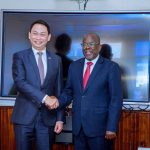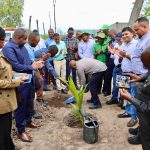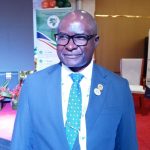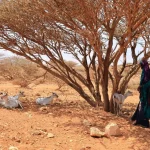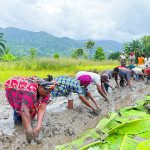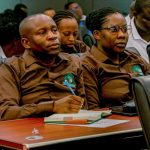Samwel Nsima Marandu, a successful cotton farmers in Kapanga village of Tanganyika District in Katavi region when giving a press briefing over his farming success
The District Commissioner (DC) of Tanganyika District in Katavi region, Onesmo Buswelu take part to havest cotton in the plantation of Samwel Nsima Marandu, a successful cotton farmers in Kapanga within the district during the farmers field day.
BY STAFF REPORTER, KATAVI
THE government in Katavi region is contamplating to organise a special audience to help linking the cotton farmers with the potential loan providers, being in efforts to spur the general performance of the economic sector in the region.
The envisaged event will see the cotton growers convene in the round table meeting with the varied financial institutions, as well as the other key agro dealers companies accross the region.
Among others, the general focus behind the gathering is to discuss over how best the farmers can stand a chance to acquire friendly loans, especially the agro machineries to help transform their production.
The timely development surfaces following concern by the farmers in the region to have Bern crowded out from prestigious opportunities to get farming implements and cash loans from the relevant institutions.
The farmers raised their plight before the Tanganyika District Commissioner (DC) Onesmo Buswelu during the Cotton Farmers Field Day (CFFD), held over the weekend in the famous district of Katavi region under the Cotton Victoria Project.
The farmers- tailored made helpful event was organized by the Tanzania Agricultural Research Institute (TARI) in collaboration with Tanzania Cotton Board (TCB), attracted farmers and extension officers from the four districts of Katavi region, including Mpanda, Nsimbo, Mlele and theTanganyika district.
Being a promised way to solve the farmers challenge, the DC observed that through the coming meeting, the farmers will also get an ample opportunity to be imparted with key knowledge on how to apply and grab diverse loans, including farming implements.
“The meeting will feature useful institutions and agro dealer companies that are collaborating to roll out capital and machinery loans, thus make sure you use the podium effectively to understand and apply for the same in order to heighten your farming executives and productivity,” he underscored.
Together with that, the DC said the government was working to make effective supervision of cotton markets to ensure the farmers are equally getting payments of their cotton sells and on proper time.
He said cotton production trend was keep on getting good momentum in the region, especially after the farmers to be introduced to the new cotton planting spacing by the r Cotton Victoria Project (CVP).
During the event, a successful farmer, Samwel Nsima Marandu of Kapanga village remains to be an icon who has grabbed the opportunity by using the new spacing planting regime of 60cm by 30 cm introduced by Cotton Victoria Project.
Speaking during the event, Marandu expressed that, previously while using 90 cm by 40cm spacing he could harvest 300 kilos of Cotton per acre.
With the new planting spacing, he unveiled, he has managed to harvest an average of 860 kilos of Cotton per acre in this season.
And he further noted that he was working to harvest 1000 kilos per acre with the use of recommended good agricultural practices.
The on-going project, CVP, which commenced from 2017/18 seasson is a partnership between Brazil, Tanzania, Kenya, and Burundi, with the goal to increase the institutional capacity and human resources training in the use and dissemination of technology in the cotton production sector.
Several stakeholders in the cotton value chain from within and outside the country are bridging up efforts in the implementation of the vital initiative in several regions around Lake Victoria, including Mwanza region.
The stakeholders include the Ministry of Agriculture of Tanzania, the Brazilian Cooperation Agency (ABC), the Brazilian Cotton Institute (IBA), the Federal University of Lavras (UFLA), the Tanzania Agricultural Research Institute (TARI-Ukiriguru) and the Tanzania Cotton Board (TCB).

